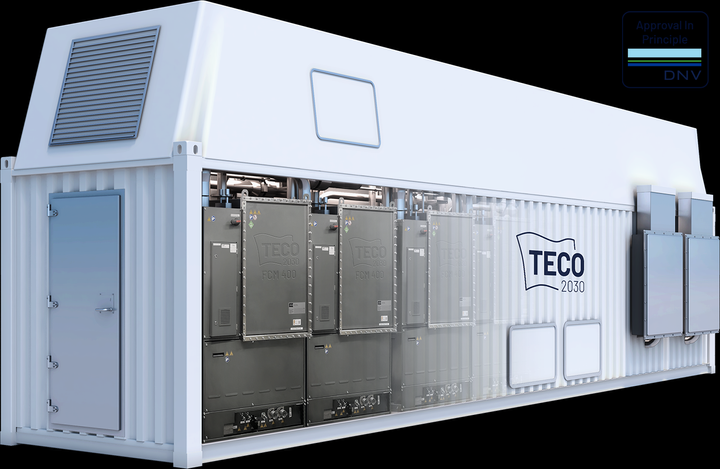Norwegian cleantech company TECO 2030 has, in connection to the HyEkoTank project, received approval in principle (AIP) from compatriot classification society DNV for a containerized fuel cell power generator (FCPG) for use onboard oceangoing applications.

According to the company, TECO 2030 containerized FCPG represents ‘a pioneering solution’ in the maritime industry.
It is a complete power generator system that can integrate with a ship’s main switchboard, offering efficient power generation while emitting nothing but warm water and air, thus significantly reducing harmful emissions and environmental impact.
Included in the approval in principle are various integral components of the FCPG, ensuring its integration and operational efficiency. These components encompass the fuel preparation system, fuel cell module holding room, electro-technical room, battery room, HVAC and auxiliaries, inerting system, and airlock. Each element plays a crucial role in ensuring the reliability, safety, and performance of the FCPG system.
“We are pleased to announce that our fuel cell power generators have received an approval in principle from DNV. This proves it is safe to utilize onboard a vessel, for propulsion and auxiliary power,” Tore Enger, Group CEO, TECO 2030, commented.
“This solution can of course be combined in series to facilitate multimegawatt installations and power requirements, without releasing any harmful emissions,” Enger added.
Recently, TECO 2030 also won DNV AIP for its compressed hydrogen fuel systems which affirmed the viability and safety of the system design.
These systems are designed to be applicable for all ship types and encompass essential components such as the bunkering system, inerted tank connection space, fuel storage hold space, fuel supply system (including pressure control), and gas relief system.
TECO 2030 is setting up Europe’s first giga production facility of hydrogen PEM fuel cell stacks and modules in Narvik, Norway. The production capacity will be built up through 2024 and 2025, targeting an output capacity of up to 200 MW of fuel cells in 2025, increasing to 1.6 GW in 2030.


